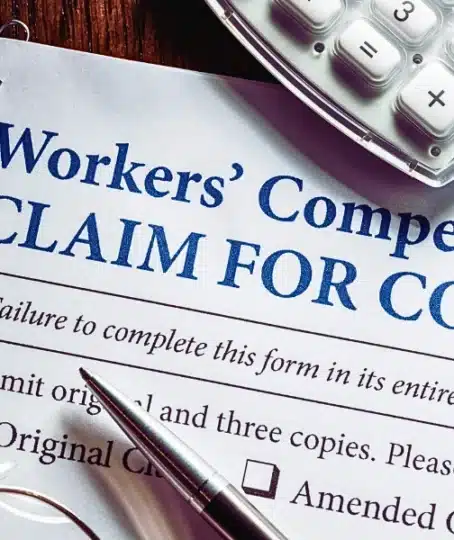
A construction worker was injured in a Peoria County construction zone after a delivery van crossed into a closed lane...


If an employer doesn’t carry workers’ compensation insurance in Illinois, that employer may face criminal charges, fines, work-stop orders, and personal injury lawsuits. State laws require most employers to have this insurance policy to cover work-related injuries or illnesses. This coverage bars injured employees from bringing personal injury claims against their employers. An employer who lacks valid workers’ comp insurance is ineligible for this protection. That means you can pursue your damages in a civil court if you sustained a work-related injury while working for an uninsured employer. You may also be eligible for benefits under the Injured Workers’ Benefits Fund (IWBF).
A seasoned Illinois workers’ comp lawyer understands the statutes governing workers’ comp cases involving uninsured employers. The lawyer will guide you on the best course of action when dealing with the uninsured employer and safeguard your legal rights every step of the way.

At Strong Law Offices, we have a team of workers' compensation lawyers who understand the financial setbacks and physical limitations that employees endure after getting injured or sick on the job. Our legal team can help you file a claim and get compensation, even if your employer doesn't carry workers' compensation insurance. Call us at 309-393-2928 to schedule a free case review.
Illinois workers' compensation insurance covers injuries or illnesses employees may suffer within the scope of their employment. It provides several benefits, including paying a portion of your lost income.
This insurance coverage caters to the medical expenses you incurred due to the job-related injury or sickness. It covers a range of medical costs, including:
On top of medical benefits, you may be entitled to disability benefits under workers’ compensation insurance if your job-related injury or illness has prevented you from returning to work. The type of disability benefits you receive depends on the severity of your injury and its impact on your ability to resume working. These benefits include temporary partial disability (TPD), temporary total disability (TTD), permanent partial disability (PPD), and permanent total disability (PTD).
You may receive vocational rehabilitation benefits if your injury or illness keeps you from performing your previous work duties and rehabilitative care is necessary to secure another job. These benefits will cover physical therapy and rehabilitative training costs.
Your family may receive death benefits if you die because of a work-related accident. These benefits could pay the medical costs you incurred before your death and your funeral and burial costs.
The Illinois Workers’ Comp Act requires nearly all employers to carry workers’ compensation insurance. The insurance covers up to 91% of workers in the state. Employers who knowingly and deliberately violate this act by failing to pay for the insurance may face serious legal consequences.
The state imposes fines on companies that willfully fail to carry workers' compensation, a strategy that dents their finances. Although many noncompliance cases don't result in imprisonment, an employer doing business without this insurance may be fined $500 for each day it operates without insurance. The law holds the corporate officers personally responsible for paying the fine.
Moreover, if the corporate officers negligently failed to take out insurance, they might be charged with a Class-A misdemeanor. A Class-A misdemeanor conviction carries up to a year in prison or up to $2,500 in fines. C-level managers who knowingly fail to obtain insurance may face a Class-4 felony. The punishment for a Class-4 felony conviction is one to three years in prison or a fine of up to $25,000.
These legal fines are paid to the Illinois Workers’ Compensation Commission (IWCC) and used to finance the Illinois Injured Workers' Benefits Fund (IWBF).
An uninsured employer also loses legal immunity against employee lawsuits. Typically, the law doesn't allow you to file a lawsuit against your employer if the employer offers workers' compensation benefits. If, however, an employer knowingly hasn't taken out insurance, the employer loses legal protection under the Workers’ Comp Act. You can file a personal injury lawsuit against such an employer in a civil court and recover the full scope of your damages.
The IWCC has the legal authority to issue work-stop orders to businesses discovered to be operating without workers’ comp coverage. If it does, the non-compliant company must cease all operations until it obtains and shows proof of insurance.
If your employer has workers’ compensation insurance, you can receive benefits after sustaining job-related injuries without much trouble. The claims process is generally straightforward. You report the incident to your employer, who notifies the insurance provider responsible for covering the damages.
But how can you protect your legal rights if you suffer an injury and your employer is uninsured?
One option is to pursue your benefits from IWBF. You must, however, satisfy the following conditions to qualify for IWBF payments.
Your first step should be to submit a written report informing your employer that you've been hurt at work. You must do that within 45 days. Your written report must include:
All workers' compensation claims must be filed in CompFile, IWCC's electronic filing system. Claimants must satisfy several requirements and steps when filing the claim. This involves accessing the CompFile portal, pressing "Register," and completing the registration form. IWCC will send you a verification email. You should then follow the instructions provided in the email to complete the registration process.
Once registered, go to the CompFile homepage and click "Applications" to access the "Application for Adjustment of Claim" form. Name the employer and the State Treasurer in the application, and fill out all other relevant spaces. Once done, submit your application.
You must serve the State Treasurer with the application. You must also keep the Treasurer updated on all proceedings. The treasurer is the ex officio Custodian of IWBF.
Obtaining a final workers’ compensation award is another eligibility requirement for IWBF payments. An award is considered final when the last appeal deadline has passed without an appeal getting filed.
Another option for pursuing compensation for your job-related injuries when your employer is uninsured is to bring a lawsuit against your employer. A successful personal injury lawsuit allows you to recover various damages, including pain and suffering, which are often excluded from workers’ compensation insurance.
Pursuing compensation when your employer doesn’t carry workers’ compensation insurance can be a challenging task for someone with little or no legal experience. Fortunately, an Illinois workers’ compensation lawyer can discuss all your available options and ensure you make an informed decision. Still, you must know what to consider when hiring a workers’ comp lawyer to increase your chances of hiring the right lawyer for your situation.
Your lawyer can do the following:
A workers’ comp lawyer can help you pursue IWBF benefits if your employer is uninsured or underinsured. The lawyer will handle the paperwork to ensure everything is done right.
An injured employee who want to initiate a workers’ comp claim must do so within three years from the accident date or two years from the date the employee received his or her last benefits payment, whichever is later. The injured employee must also file an injury report within 45 days of the accident.
Keeping track of these deadlines and meeting them can be challenging. Your lawyer can, however, save you the hassle. The lawyer is familiar with these deadlines and will ensure all the required legal documents are ready and submitted in time.
Your lawyer will present compelling evidence-backed arguments during hearings before the IWCC. He or she will push for the maximum benefits entitled to you under the Illinois Workers’ Comp Act.
At Strong Law Offices, we have aggressive workers’ compensation lawyers who can help you pursue compensation for your injuries even when your employer is underinsured or uninsured. Contact us today to request a free consultation. You will not incur any legal fees unless you win.

A construction worker was injured in a Peoria County construction zone after a delivery van crossed into a closed lane...

Your Duty to Report a Work Injury in Illinois Under the Illinois Workers’ Compensation Act, injured employees must notify their...

What Factors Determine Your Average Weekly Wage in Illinois Workers’ Compensation? Besides covering your medical bills, workers’ comp gives you...